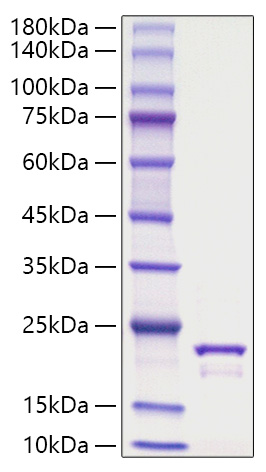Description
Recombinant Human FGF-4 Protein
The Recombinant Human FGF-4 Protein is a biologically active recombinant protein that plays a significant role in various cellular processes and signaling pathways in human biology. This protein is widely employed in immunological research, cell biology studies, protein-protein interaction analyses, and therapeutic development, providing researchers with a reliable tool for investigating FGF-4 function and its implications in health and disease.
This product (SKU: RPCB1209) is produced using E. coli and features a NO-tag tag for convenient detection and purification. The protein exhibits a calculated molecular weight of 19.76 kDa with an observed molecular weight of 20 kDa under denaturing conditions, achieving ≥ 95 % as determined by SDS-PAGE., ensuring exceptional quality and consistency for research applications.
Key Features
| High Purity by Affinity Chromatography | |
| Mammalian & Bacterial Expression Systems | |
| High lot-to-lot consistency via strict QC |
| Product Name: | Recombinant Human FGF-4 Protein |
| SKU: | RPCB1209 |
| Size: | 10 μg , 20 μg , 100 μg |
| Reactivity: | Human |
| Synonyms: | HST, KFGF, FGF-4, HST-1, HSTF1, K-FGF, HBGF-4, HSTF-1, FGF4 |
| Tag: | NO-tag |
| Expression Host: | E. coli |
| Calculated MW: | 19.76 kDa |
| Observed MW: | 20 kDa |
| Gene ID: | 2249 |
| Protein Description: | High quality, high purity and low endotoxin recombinant Recombinant Human FGF-4 Protein (RPCB1209), tested reactivity in E. coli and has been validated in SDS-PAGE.100% guaranteed. |
| Endotoxin: | < 0.1 EU/μg of the protein by LAL method. |
| Purity: | ≥ 95 % as determined by SDS-PAGE. |
| Formulation: | Lyophilized from a 0.22 μm filtered solution of PBS, pH 7.4. |
| Reconstitution: | Centrifuge the vial before opening. Reconstitute to a concentration of 0.1-0.5 mg/mL in sterile distilled water. Avoid vortex or vigorously pipetting the protein. For long term storage, it is recommended to add a carrier protein or stablizer (e.g. 0.1% BSA, 5% HSA, 10% FBS or 5% Trehalose), and aliquot the reconstituted protein solution to minimize free-thaw cycles. |
| Storage: | Store at -20℃.Store the lyophilized protein at -20℃ to -80 ℃ up to 1 year from the date of receipt. After reconstitution, the protein solution is stable at -20℃ for 3 months, at 2-8℃ for up to 1 week. |
FGF (fibroblast growth factor) signalling is known to be required for many aspects of mesoderm formation and patterning during Xenopus development and has been implicated in regulating genes required for the specification of both blood and skeletal muscle lineages. Fibroblast growth factor 4 (FGF4) signaling induces differentiation from embryonic stem cells (ESCs) via the phosphorylation of downstream molecules such as mitogen-activated protein kinase/extracellular signal-related kinase (MEK) and extracellular signal-related kinase 1/2 (ERK1/2). Fibroblast Growth Factor 4 (FGF-4) could not only increase the proliferation of bone marrow mesenchymal stem cells (BMSCs), but also induce BMSCs into hepatocyte-like cells in vitro. FGF4 transduced BMSCs contributed to liver regeneration might by the transplanted microenvironment. The FGF4-bFGF BMSCs thus can enhance the survival of the transplanted cells, diminish myocardial fibrosis, promote myocardial angiogenesis, and improve cardiac functions.







